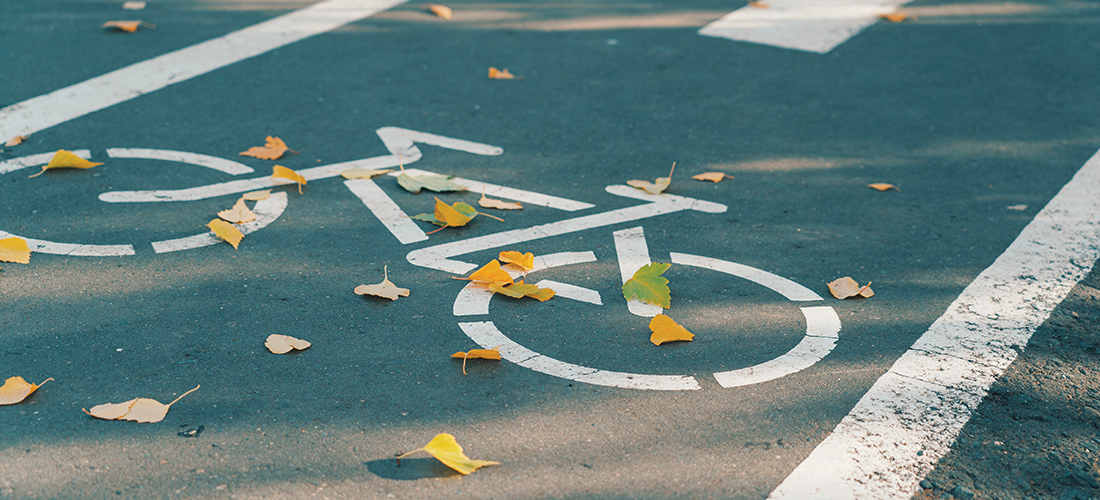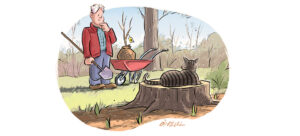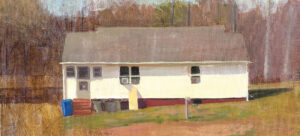
Stranger Things
Samaritans on the way to Summerfield
By Maria Johnson
It sounds weird to say, but I honestly don’t know how the accident happened.
I remember rolling down the Atlantic & Yadkin Greenway on my mountain bike that Friday afternoon a few months ago.
I remember coming up on the tunnel under U.S. 220, near Summerfield, and noticing that the inside walls had been painted with a bright mural. It looked like something kids had done. Was it flowers in a field?
I remember thinking it was going to be cool to pedal through the artwork and get a closer look.
But I didn’t get that far.
The next thing I knew, I was losing control of the bike and veering off the path.
Had I hit a patch of gravel where the surface changed?
Had my chain slipped?
I have no idea.
I can still feel the sickening realization that I was going down; then the shock of impact followed by a burst of pain in my shoulder; and the instant knowledge that something was broken — but not my head, thanks to my helmet.
My next memory is of three people moving toward me: a young man and woman, and, behind them, an older man with a big black-and-white dog.
The young man helped me up and allowed me to lean on him, which was a good thing because my legs were shaking. I could not have stood on my own.
He walked me over to the tunnel and suggested that I sit with my back against the wall. He asked several questions, which, even through my daze, I could tell were designed to assess my mental and physical state.
“Are you a medical person?” I asked. “Because you talk like it.”
He smiled and said no. But he’d been a lifeguard at YMCA camps and knew a lot about first aid.
The young woman pointed out the bloody scrapes on my right leg and arm.
“It’s her shoulder that I’m worried about,” he said, staring at my right collarbone.
I tried to glance down. I couldn’t see much. I didn’t really want to.
He asked if there was someone he could call.
“My husband, Jeff.”
“Do you know his number?”
“Yeah, I know his number.”
Looking back, I think it’s a small miracle that the young man — whose name I later learned was Jacob — did not call my husband and say, “Your banged-up, coherent, smart-ass wife just wrecked her bike on the greenway. Please come get her.”
Instead, Jacob told Jeff where to park and went off to meet him.
Meanwhile the young woman, Joan, and the older man, Robert — along with his dog, Pepper — stayed with me and chatted. It was amazingly amiable, considering the circumstances.
I turned to Joan: “Are you connected to the Y, too?”
No, she said. She had finished her master’s degree in counseling at UNCG and was getting ready to start a new job with a family-focused practice inside a couple of old homes on Spring Street in Greensboro.
“That’s funny,” I said, explaining that this magazine’s first office was in one of those homes.
In that moment, I could see the front room where our young editor hung her dream catcher, the wonky, windowless room that connected the front room to the kitchen. I could see the staircase, the landing, the upstairs room where our crew draped ourselves over armchairs and a futon to laugh and curse and argue and conjure a never-ending stream of story ideas.
Soon, Joan would come to know the same spaces through her work with young children.
A feeling hit me. It was more woo-woo than woozy.
I turned to Robert.
“What about you? Are you retired — to be walking your dog in the middle of the day?” I asked him.
Yes, he said, from the old post office on Banking Street.
Again, the small-world feeling washed over me.
I told him that O.Henry’s second office was in the Dutch-barn-shaped building next door. I used to mention the old post office as a landmark when giving people directions because everyone seemed to know where it was.
“That was a great post office,” I said sincerely.
Robert nodded.
It occurred to me that there must have been times when we were working within Bluetooth range of each other.
So far, only a few yards and years had separated me, Robert and Joan. And now, here we were, the three of us, hanging out under a highway on a Friday afternoon.
It was as if time and space had folded so that we finally met face-to-face just when I needed them most.
“Well,” I said to my tunnel peeps, “I hope no one else shows up because I’m running out of former workplaces to have in common.”
They stayed with me until Jacob returned with Jeff, who whisked me to an emergency room.
Joan and Jacob took my bike — they had a rack on their car — and dropped it off at our house.
Five hours later, an emergency room doctor confirmed that my collarbone was broken in a couple of places
A few days after that, an orthopedist assured me the bones would knit without surgery if I kept my right side quiet for eight weeks.
That was 12 weeks ago.
The road rash scabs have been replaced by shiny, pink skin.
My sling is folded up in a closet.
I’m doing physical therapy to regain strength.
The bone-deep ache is fading.
What persists, though, is the memory of three strangers who ran to my aid. They knew nothing about me — where I lived, how I voted, what I believed, whom I loved.
None of that mattered. They saw I was hurting and — maybe because my need was so obvious — they responded with care.
Once they came closer, we found we had things in common.
It sounds weird to say, but that gave me hope — in the midst of pain.
And for that, I am thankful. OH
Maria Johnson is a contributing editor of O.Henry. Contact her at ohenrymaria@gmail.com.





